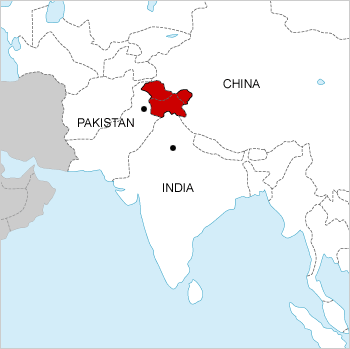
Kashmir
Kashmir has been a source of strife between India and Pakistan since the two countries came into being in 1947. Major clashes occurred in 1947-48, 1965 and 1999, when Pakistani forces crossed the border, prompting a violent response from India. In the 1971 war, Pakistan lost its eastern wing, but Kashmir was a major conflict zone then also. Both countries, meanwhile, conducted nuclear tests in May 1998 and declared themselves to be nuclear states.
Since 2003, a ceasefire has held along the Line of Control that divides the Indian and Pakistani-held parts of Kashmir. But this has not deterred Pakistan from using subversion, militancy and terrorism to pursue an intransigent foreign policy in Kashmir. Cross-border insurgency and terrorism mounted by Pakistan since 1989 has undermined the security situation, although such activity has dropped considerably recently due to Pakistan’s preoccupation with the militancy within its own borders.
However, the peace process between India and Pakistan, including its emphasis on Kashmir-related issues, has been on hold since the Mumbai attacks in November 2008 were traced back to Pakistan. The eventual revival of the peace process and greater connectivity by enlarging the movement of people and trade across the Line of Control would go a long way toward diminishing the prevailing crisis.
Still, realistically speaking the militancy will not subside until New Delhi comes to some sort of arrangement with the alienated groups in Kashmir. There are no definite signs this will take place, although efforts have been made by New Delhi to stimulate a dialogue with the leaders of such groups. These negotiations have not made much progress since the groups’ demands for independence are wholly unacceptable to India. Moreover, prominent negotiators have often been killed by extremists, further dampening any initiatives. It seems for the time being that Pakistan will always find fertile ground in Kashmir to mount subterranean cross-border operations.
Looking further ahead, a new security threat focusing on Kashmir is forming, tied to the retreat of the Himalayan glaciers. These glaciers are the source for the snow-fed rivers of the Indus basin and their flow through Kashmir into Pakistan are a lifeline. But the volume of water provided by the Indus rivers seems to be falling — steadily but inexorably — meaning any failure to find a way of cooperating on the issue could worsen Indo-Pakistan relations. This dispute may even reach crisis proportions by 2020.
P.R.Chari is a research professor at the Institute of Peace and Conflict Studies in New Delhi.











